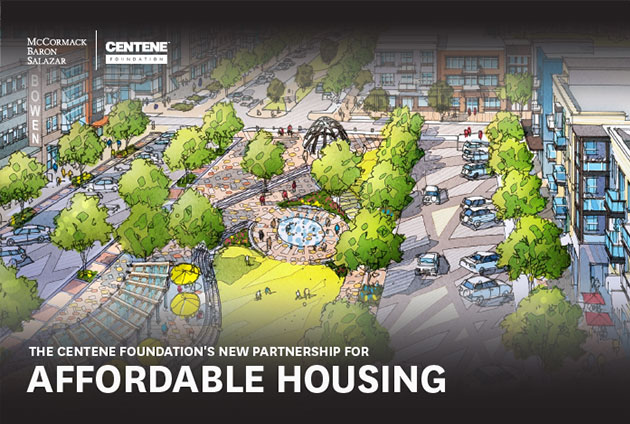Centene Foundation Launches Innovative Initiative to Increase Access to Affordable Housing in Partnership with McCormack Baron Salazar
05/21/2024

If Centene wants to achieve its mission of transforming the health of the communities it serves, one person at a time, advancing health equity is imperative. Research shows that only an estimated 20 percent of health outcomes are linked to healthcare, while the balance is driven by other factors including drivers of health (DOH) such as access to affordable and stable housing.
The Centene Foundation’s philanthropic efforts focus specifically on investing in programs that improve the lives and health of our members – not only through access to quality healthcare, but also by reducing the barriers to that care. Its newest initiative, announced Monday, is designed to do this by accelerating the development of affordable housing, which is needed nationwide. In 2023, the National Low Income Housing Coalition (NLIHC) reported a nationwide shortage of 7.3 million affordable homes in the US.
The multiyear partnership with esteemed St. Louis firm McCormack Baron Salazar (MBS), one of the nation’s leading developers of affordable housing, will provide predevelopment loans to advance low-income housing projects. This type of funding is hard to come by for developers in this space, but critical to launch projects that address the growing need for affordable housing. The loans are anticipated to enable approximately $900 million of direct construction-related activity, supporting the creation of thousands of affordable housing units in low-income communities across the country. Centene sees this as a crucial gap to fill in advancing health equity, which makes it a crucial issue for our members.
“Having a safe, stable and affordable place to call home gives a person the foundation they need for a healthy life,” said Centene’s Chief Health Officer Dr. Alice Chen. “It can help limit exposure to unsafe conditions and stress as well as increase their likelihood of receiving primary and preventive care.”
This initiative will facilitate the development of units that will make a meaningful difference in the lives of many of Centene’s members and their communities. In addition to providing homes for thousands, it will also create valuable first-floor commercial space that can potentially be used for clinics, grocery stores, gyms or other resources that can benefit the health of the community.
MBS has deep experience working on this type of project. As the nation’s leader in affordable housing development, MBS has completed 239 housing developments across 27 states and territories over the last 50 years.
While this method of funding is new for the Centene Foundation, tackling the housing crisis and homelessness is not. The Centene Foundation has partnered with organizations in several of Centene's markets in recent years on related initiatives.
In Pennsylvania, the Foundation and Pennsylvania Health and Wellness partnered with Habitat for Humanity of the Greater Harrisburg Area’s Critical Home Repair program, which helps keep low-income families in their existing homes with home repairs to increase safety, accessibility and livability.
In California, the Centene Foundation provided a grant for the Union Rescue Mission in South Los Angeles. This housing facility, which has 86 family units, has housed 246 previously homeless families since opening in April 2022.
Centene's health plans also support additional housing initiatives in several markets, further extending the broader enterprise’s impact on housing and homelessness.
Centene's Chief Charitable Giving Officer and Centene Foundation President, Keith Williamson, is thrilled to continue this work in partnership with a leader in the industry that also happens to be based in Centene's hometown of St. Louis.
“MBS has a long and successful history of bringing affordable housing projects to fruition, and we are grateful to have their partnership on this important initiative,” Keith said. “Working together, we’ll be able to have a major impact on member communities that we couldn’t deliver alone.”